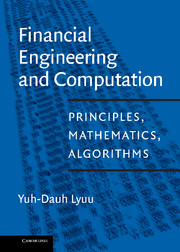Book contents
- Frontmatter
- Contents
- Preface
- Useful Abbreviations
- 1 Introduction
- 2 Analysis of Algorithms
- 3 Basic Financial Mathematics
- 4 Bond Price Volatility
- 5 Term Structure of Interest Rates
- 6 Fundamental Statistical Concepts
- 7 Option Basics
- 8 Arbitrage in Option Pricing
- 9 Option Pricing Models
- 10 Sensitivity Analysis of Options
- 11 Extensions of Options Theory
- 12 Forwards, Futures, Futures Options, Swaps
- 13 Stochastic Processes and Brownian Motion
- 14 Continuous-Time Financial Mathematics
- 15 Continuous-Time Derivatives Pricing
- 16 Hedging
- 17 Trees
- 18 Numerical Methods
- 19 Matrix Computation
- 20 Time Series Analysis
- 21 Interest Rate Derivative Securities
- 22 Term Structure Fitting
- 23 Introduction to Term Structure Modeling
- 24 Foundations of Term Structure Modeling
- 25 Equilibrium Term Structure Models
- 26 No-Arbitrage Term Structure Models
- 27 Fixed-Income Securities
- 28 Introduction to Mortgage-Backed Securities
- 29 Analysis of Mortgage-Backed Securities
- 30 Collateralized Mortgage Obligations
- 31 Modern Portfolio Theory
- 32 Software
- 33 Answers to Selected Exercises
- Bibliography
- Glossary of Useful Notations
- Index
9 - Option Pricing Models
Published online by Cambridge University Press: 19 September 2009
- Frontmatter
- Contents
- Preface
- Useful Abbreviations
- 1 Introduction
- 2 Analysis of Algorithms
- 3 Basic Financial Mathematics
- 4 Bond Price Volatility
- 5 Term Structure of Interest Rates
- 6 Fundamental Statistical Concepts
- 7 Option Basics
- 8 Arbitrage in Option Pricing
- 9 Option Pricing Models
- 10 Sensitivity Analysis of Options
- 11 Extensions of Options Theory
- 12 Forwards, Futures, Futures Options, Swaps
- 13 Stochastic Processes and Brownian Motion
- 14 Continuous-Time Financial Mathematics
- 15 Continuous-Time Derivatives Pricing
- 16 Hedging
- 17 Trees
- 18 Numerical Methods
- 19 Matrix Computation
- 20 Time Series Analysis
- 21 Interest Rate Derivative Securities
- 22 Term Structure Fitting
- 23 Introduction to Term Structure Modeling
- 24 Foundations of Term Structure Modeling
- 25 Equilibrium Term Structure Models
- 26 No-Arbitrage Term Structure Models
- 27 Fixed-Income Securities
- 28 Introduction to Mortgage-Backed Securities
- 29 Analysis of Mortgage-Backed Securities
- 30 Collateralized Mortgage Obligations
- 31 Modern Portfolio Theory
- 32 Software
- 33 Answers to Selected Exercises
- Bibliography
- Glossary of Useful Notations
- Index
Summary
Life can only be understood backwards; but it must be lived forwards.
Søren Kierkegaard (1813–1855)Although it is rather easy to price an option at expiration, pricing it at any prior moment is anything but. The no-arbitrage principle, albeit valuable in deriving various bounds, is insufficient to pin down the exact option value without further assumptions on the probabilistic behavior of stock prices. The major task of this chapter is to develop option pricing formulas and algorithms under reasonable models of stock prices. The powerful binomial option pricing model is the focus of this chapter, and the celebrated Black–Scholes formula is derived.
Introduction
The major obstacle toward an option pricing model is that it seems to depend on the probability distribution of the underlying asset's price and the risk-adjusted interest rate used to discount the option's payoff. Neither factor can be observed directly. After many attempts, some of which were very close to solving the problem, the breakthrough came in 1973 when Black (1938–1995) and Scholes, with help from Merton, published their celebrated option pricing model now universally known as the Black–Scholes option pricing model [87]. One of the crown jewels of finance theory, this research has far-reaching implications. It also contributed to the success of the CBOE [660]. In 1997 the Nobel Prize in Economic Sciences was awarded to Merton and Scholes for their work on “the valuation of stock options.”
The mathematics of the Black–Scholes model is formidable because the price can move to any one of an infinite number of prices in any finite amount of time.
- Type
- Chapter
- Information
- Financial Engineering and ComputationPrinciples, Mathematics, Algorithms, pp. 92 - 122Publisher: Cambridge University PressPrint publication year: 2001
- 1
- Cited by



